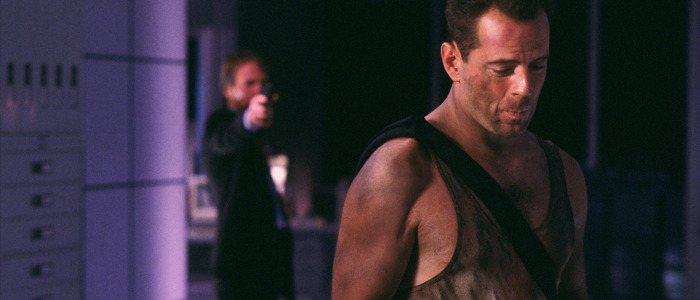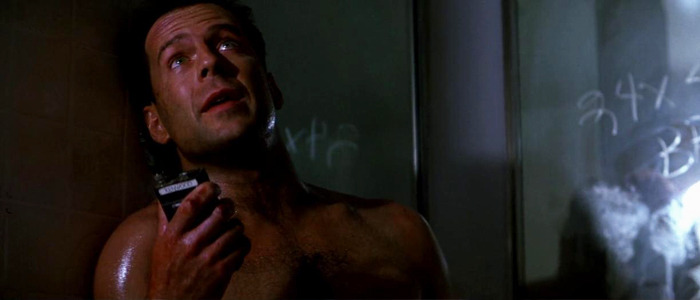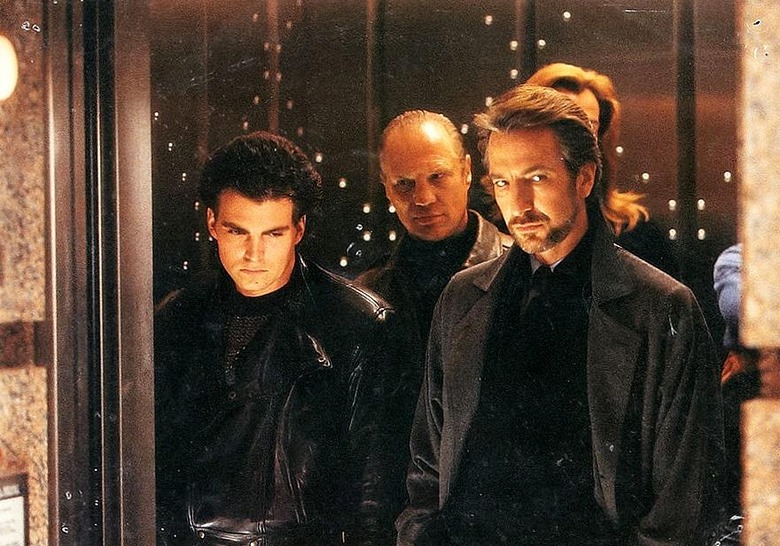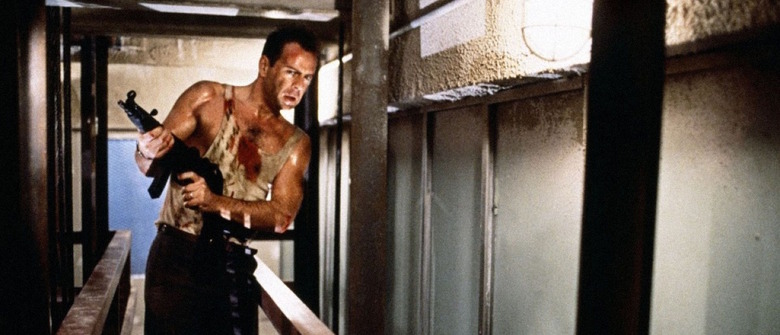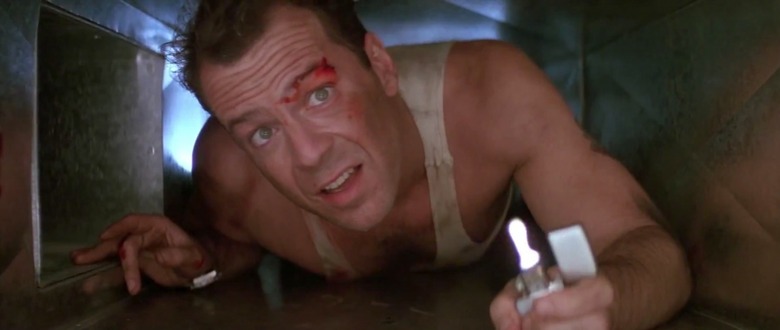11 Modern Filmmakers Explain How 'Die Hard' Influenced Them [Updated]
(This week marks the 30th anniversary of Die Hard, arguably the greatest action movie of all time. To celebrate, /Film is exploring the film from every angle with a series of articles. Today: we spoke with ten modern filmmakers about why the movie still holds up, how it influenced their work, and more.)
The first shot in Die Hard is a plane landing on a runway. But the second shot does something relatively atypical for the testosterone-fueled action movies of the 1980s: it established a weakness in its protagonist. New York cop John McClane (Bruce Willis) is afraid of flying, and the first thing we see of him is his hand tightly gripping his armrest. His seat neighbor gives him an odd remedy for stress relief, and when McClane eventually gives it a try during a Christmas party at L.A.'s Nakatomi Plaza, a hostile takeover leaves him barefoot at the worst possible moment.
But that weakness gives the character some much-needed humanity, a far cry from the muscle-bound lugs embodied by actors like Schwarzenegger and Stallone at the time. That humanity and relatability is a huge part of the reason the film remains a stone cold classic three decades after its release. In the latest entry in our series of articles looking back on Die Hard, /Film spoke with a handful of modern Hollywood directors and writers about the impact the film had on them, how it influenced their work, why the movie has stood the test of time, and more.
Darren Aronofsky (Writer/Director – Requiem for a Dream, The Wrestler): I love that it starts off with "Christmas in Hollis" by Run-DMC. I can still remember that moment when I was in the theater in Brooklyn and it came blasting through the sound system. The crowd went nuts.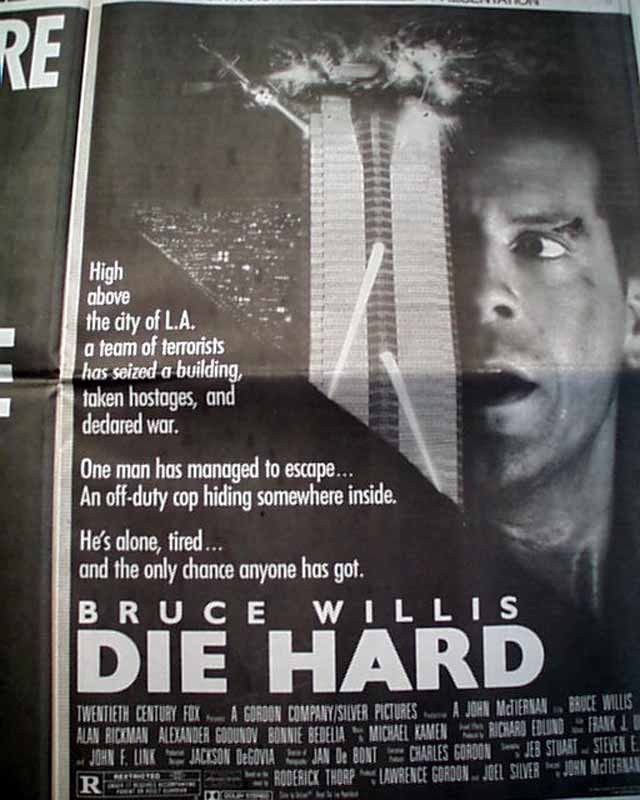 Colin Trevorrow (Co-Writer/Director – Jurassic World, upcoming Jurassic World 3): I was eleven when Die Hard came out. I remember the look on Bruce Willis' face in the newspaper ad. The guy was clearly in a serious situation. I had to see the movie. The San Francisco Chronicle has a different system for reviewing films—instead of stars it's a little cartoon man in various levels of enjoyment. If he doesn't like the movie, the chair is empty. Next level up he's asleep. Then he's watching attentively, then clapping. But the highest level, the one I will reach for my whole career, is the little man jumping on his chair, just going nuts. I remember Die Hard had the highest level of little man enjoyment. But there was no chance I was getting into the movie theater. So I waited. Watched from afar. And in the summer of '89, my neighbor Brandon rented it with his dad. I nonchalantly asked if I could have dinner at Brandon's that night.Dan Trachtenberg (Director – 10 Cloverfield Lane): It was playing in a video store and I was sneaking glances of it while being ushered away with my friends when I was in elementary school and dying to see it for real. I fell in love with it, of course, when I finally saw it. But even at a young age, Die Hard really – I was like, 'Oh my God, he's a regular guy! And his feet hurt!' I was able to receive all of what was really, really special about it. I liked his balding hair and how he looked like a tough dude in the tank top, and I remember saying, 'I wish I looked cool like that. I hate that I'm so skinny.' I wanted to look more like a dad because I thought he was so cool.Paul Scheer (Writer – NTSF:SD:SUV, upcoming Galaxy Quest): As a kid, seeing Die Hard was like, 'Whoa!' You could be funny and you were charming, but you were also a guy that looks like – for lack of a better term – a normal person. You're not all buffed up. You're not even 'Paul Rudd in Ant-Man' buffed up. It really felt like this novel thing.Joe Carnahan (Writer/Director – The A-Team, The Grey): I remember at the time, it was, 'Hey, the guy in Moonlighting is in an action movie!' People were laughing about it. I don't think a lot of people were taking it seriously. But I remember going opening weekend. I think I went on a Saturday night and the theater was full, and I remember thinking, 'Wow, that movie kicked ass! Holy s***, the guy from Moonlighting! That was a legit action movie! That was great!'Brian Taylor of Neveldine/Taylor (Co-Writer/Co-Director – Crank, Crank 2: High Voltage): I took my son to go see the movie probably seven or eight years ago. I gave him the full disclaimer. 'I don't know if you're going to like this movie, it doesn't have any CG, the action might seem a little primitive compared to modern movies, there may be aspects of it that are dated, maybe the print's a little faded, but give it a shot and see if you like it.' This is a kid who was raised on Pixar movies and Transformers and stuff. We walked out of the theater, and he was like, 'That was the greatest movie I've ever seen.' It had the same impact on him as it did on me as a kid. It just works, and it's never stopped working.Paul W.S. Anderson (Writer/Director – Resident Evil, Death Race): It was a very important movie for me, because when I was an aspiring filmmaker living in England, it defined the kind of movie that I wanted to make. When people would say to me, 'What kind of movies do you want to make?' I'd always say Die Hard really encapsulates what I loved about cinema, especially growing up where the cinema of England at that time, I didn't find terribly inspirational. I felt like my generation was not really represented in the cinema. We didn't make terribly commercial movies. British movies weren't really represented in the cinema unless you were like a lover of arthouse cinema, or if you really loved sexually repressed butlers in the 1950s, there were loads of movies for you. But if you just wanted to see something that was just entertainment in a multiplex, the UK cinema industry didn't make those kinds of movies.
Colin Trevorrow (Co-Writer/Director – Jurassic World, upcoming Jurassic World 3): I was eleven when Die Hard came out. I remember the look on Bruce Willis' face in the newspaper ad. The guy was clearly in a serious situation. I had to see the movie. The San Francisco Chronicle has a different system for reviewing films—instead of stars it's a little cartoon man in various levels of enjoyment. If he doesn't like the movie, the chair is empty. Next level up he's asleep. Then he's watching attentively, then clapping. But the highest level, the one I will reach for my whole career, is the little man jumping on his chair, just going nuts. I remember Die Hard had the highest level of little man enjoyment. But there was no chance I was getting into the movie theater. So I waited. Watched from afar. And in the summer of '89, my neighbor Brandon rented it with his dad. I nonchalantly asked if I could have dinner at Brandon's that night.Dan Trachtenberg (Director – 10 Cloverfield Lane): It was playing in a video store and I was sneaking glances of it while being ushered away with my friends when I was in elementary school and dying to see it for real. I fell in love with it, of course, when I finally saw it. But even at a young age, Die Hard really – I was like, 'Oh my God, he's a regular guy! And his feet hurt!' I was able to receive all of what was really, really special about it. I liked his balding hair and how he looked like a tough dude in the tank top, and I remember saying, 'I wish I looked cool like that. I hate that I'm so skinny.' I wanted to look more like a dad because I thought he was so cool.Paul Scheer (Writer – NTSF:SD:SUV, upcoming Galaxy Quest): As a kid, seeing Die Hard was like, 'Whoa!' You could be funny and you were charming, but you were also a guy that looks like – for lack of a better term – a normal person. You're not all buffed up. You're not even 'Paul Rudd in Ant-Man' buffed up. It really felt like this novel thing.Joe Carnahan (Writer/Director – The A-Team, The Grey): I remember at the time, it was, 'Hey, the guy in Moonlighting is in an action movie!' People were laughing about it. I don't think a lot of people were taking it seriously. But I remember going opening weekend. I think I went on a Saturday night and the theater was full, and I remember thinking, 'Wow, that movie kicked ass! Holy s***, the guy from Moonlighting! That was a legit action movie! That was great!'Brian Taylor of Neveldine/Taylor (Co-Writer/Co-Director – Crank, Crank 2: High Voltage): I took my son to go see the movie probably seven or eight years ago. I gave him the full disclaimer. 'I don't know if you're going to like this movie, it doesn't have any CG, the action might seem a little primitive compared to modern movies, there may be aspects of it that are dated, maybe the print's a little faded, but give it a shot and see if you like it.' This is a kid who was raised on Pixar movies and Transformers and stuff. We walked out of the theater, and he was like, 'That was the greatest movie I've ever seen.' It had the same impact on him as it did on me as a kid. It just works, and it's never stopped working.Paul W.S. Anderson (Writer/Director – Resident Evil, Death Race): It was a very important movie for me, because when I was an aspiring filmmaker living in England, it defined the kind of movie that I wanted to make. When people would say to me, 'What kind of movies do you want to make?' I'd always say Die Hard really encapsulates what I loved about cinema, especially growing up where the cinema of England at that time, I didn't find terribly inspirational. I felt like my generation was not really represented in the cinema. We didn't make terribly commercial movies. British movies weren't really represented in the cinema unless you were like a lover of arthouse cinema, or if you really loved sexually repressed butlers in the 1950s, there were loads of movies for you. But if you just wanted to see something that was just entertainment in a multiplex, the UK cinema industry didn't make those kinds of movies.
Carnahan: There used to be a curio shop in old Sacramento and it was all old movie paraphernalia. This was in the late '80s, early '90s. I'm dating myself. They had a big lobby card of the three-dimensional skyscraper from Die Hard for like $40. I'll never forget buying it. I was so proud of it. I had two roommates at the time – I didn't give a s***. I literally nailed it up like you'd nail up a painting in our living room, and there it sat for like a year before it started to fall apart. (laughs) You get drunk and start smashing up the skyscraper, it's not going to hold up, you know?
Influences
Trevorrow: One of the first movies I made with my Hi-8 camcorder in 1990 was claustrophobic action thriller I described to my parents as "Die Hard with a Cat". My buddy Mike Tramutola was trapped in his house, the cat was trying to kill him, he had to rely on his wits and whatever resources he could find in the kitchen. There's a scene about halfway through where he locks himself in the pantry and finds a staple gun. It's all he has to protect himself from this cat. He's leaning up against the laundry machine, checking how many staples he has left, sweating, breathing through his nose. He's not sure if he'll ever see his parents again. He's vulnerable, realizing he might not make it. It was epic and emotional. If I hadn't seen Die Hard, the character probably would have just found a rocket launcher in the garage.
Lexi Alexander (Director – Green Street Hooligans, Punisher: War Zone): One of the things that was so obvious about Die Hard was that he was just being tortured for 90 minutes. Even the shoes! All I could think about the first time I saw it was, 'Somebody please give him some shoes!' That was a big element of 'How can you take this character and literally make everything difficult for him?' Everything. So later on, I remember thinking about this as I was prepping for Punisher, and that's the difference with superheroes – you can't just do that. You can't give them slice of life obstacles, because there's a certain principle you have to follow. You can't just take them out of their uniform and say, 'Oh, the Punisher doesn't have any shoes,' or 'Superman doesn't have any shoes.' That would never fly within that world of branding.
Scheer: I did a show called NTSF: SD: SUV, which you can see all of them on Hulu. Basically, that was my attempt to be an action star. I always knew I could never be in the movies that I loved in the main lead, so what if I just created a show like this? We definitely had homages to Die Hard on our show. You're always trying to figure out, 'What could it be? What's the Die Hard version of this?' So for me, there was some very direct parody with NTSF.
Carnahan: The whole heist of the plates in The A-Team where Hannibal Smith shoots through the glass to get back into the building is a complete tip of the hat to Die Hard. That's probably my favorite scene is when he jumps off the side of the building. I always remember the blood on the glass, from his feet, was such a great touch.
Trachtenberg: We looked at it for obvious reasons when we were making 10 Cloverfield Lane, but not just because it's a contained thriller, but also in looking at how briefly it sets up the character's dilemma – not only a physical struggle, but what he's going through with his wife and how swiftly it sets that up and pays that off within the action without the movie ever feeling like it needs to slow down and pull over and go into dramatic stuff and then go back on the road. It actually does it along the way really nicely, and we tried as best we could to learn from that in making our little movie.
Joe Lynch (Director – Everly, Mayhem): I have pretty much been ripping off the first Die Hard wholesale for years. McTiernan's kinetic/balletic style has always been a huge influence on my work, especially with his use of the camera for storytelling and the way he employs sharp, European-influenced editing to excite the story further. But the bones of Die Hard specifically have been highly influential throughout my career...My last two films are indirect successors to the Die Hard genre. Everly was conceived as "Die Hard in a room," a knowing nod to the days where going into a pitch with "Die Hard in a [insert locale here]" would get your ass green-lit. Mayhem also shares much of Die Hard's DNA, from the single-location, pressure-
cooker concept to the "everyperson" protagonist defying the odds against numerous foe while getting physically annihilated in the process, bleeding their way to survive.
Anderson: What I feel like I took and I explored in my career is that Die Hard has a tremendous sense of place. Nakatomi Tower is very much a character in the movie. That sense of a place is something that I've always been obsessed with in my films, also. That has been lessened as the Die Hard franchise went on – a whole sprawling airport, and then the whole of New York City. That concept of being very focused on one location was very important.
Trevorrow: The thing I love is how the movie starts in such a benign way and takes you to a place you could never imagine. It could easily have started with John McClane catching a criminal in New York, establishing how badass he is. But it trusted the character enough to start him in a relatable place, carrying a giant stuffed Christmas bear in an airport. It definitely influenced the opening of Jurassic World, which was just a pair of brothers leaving on vacation while their parents are mediating their divorce. It makes all the insane action that follows feel like it's happening in a world you know.
Taylor: I think the Die Hard influence on Crank is actually really apparent in a couple of ways. For one, having a movie so driven by a device – in the case of Die Hard it's the fly in the ointment, the guy trapped in the building with a bunch of bad guys – you get that premise and run with it, and everything in the movie keeps coming back to that. The Raid is another movie influenced by Die Hard. It's a simple concept and they just milk it. That's definitely what we tried to do with Crank, too. It's a guy who's trapped – in the case of Crank, it's a guy trapped inside his body. But it's the same kind of thing: let's take this simple premise and just run with it.
Gareth Evans (Writer/Director – The Raid, The Raid 2): The first thing for The Raid was this idea of wanting to make something I knew I could keep within a restricted budget range. It was always that thing of, 'Well, have you got anything we could do for X amount of money?' The Raid came from that. What could we do that's contained? That was the initial thing on our part. The Raid was created in response of being able to control budget. And then once I knew it was going to be self-contained and all going to be in one building, it was looking at films like Assault on Precinct 13 and then obviously Die Hard [and seeing them as] comparison pieces. I'd be looking at all the cool low budget tricks that Carpenter used in Precinct 13, and then all of the bombastic, huge set pieces that were in Die Hard in order to try to find a way to rectify a balance between the two. I knew we were going to be working on an independent scale budget, but I still wanted to push and strive to achieve it.Carnahan: The remake of The Raid that we're going to do, without giving up too much, has a total 'explosive in the elevator shaft' tip of the hat to Die Hard.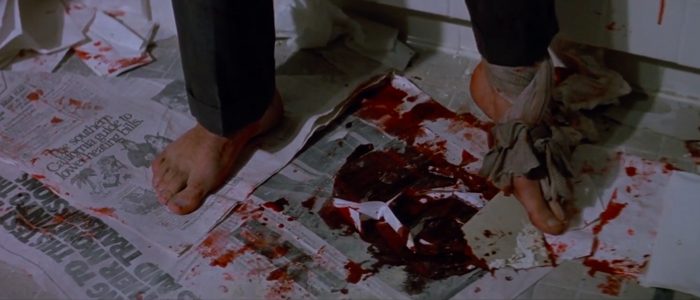
Alexander: I think that I was influenced a lot by the damn feet on the glass with the blood. I was a young kid when I saw it for the first time, and for me, it was the first time I saw blood used like that. I'm pretty sure that that's where the blood came from in Green Street that dropped onto the camera. I just thought that it was really creatively done to remind the audience that his f***ing feet are hurting. (laughs) It's something he had to do. It's not like he did it just for show, but he actually had to put his feet on the glass.
Taylor: Another influence on the Crank movies was what I consider to be maybe the greatest shot ever in an action movie, which is Hans Gruber falling in slow motion off the side of the building. It's just so satisfying, the expression on his face. I love what they did in Die Hard 3, when McClane finds out from the feds who Hans's brother is, and they call back that shot from the first movie, really for about 12 frames or something. It's just a quick flash of that shot, an instant read of every single thing you need to know about the relationship between these two guys. We did a little homage to that in Crank 2, when Chev Chelios meets Verona's brother, played by Clifton Collins. As soon as he realizes that that guy is a Verona, we did that quick flash to Ricky Verona from the first Crank movie dying in mid-air after falling out of the helicopter just to snap it back. Definitely a rip-off of that moment.
Evans: In Nakatomi Plaza, you have this amazing building that gave so many varieties of spaces, whether it's the office cubicles, the board room, or the elevator shaft. It was more like in a production design way. Obviously our tenement block [in The Raid] was not one of those fancy high rises, it was supposed to be more like a slum tower block. So for us, it was a different thing. But what we wanted to do was to play with those spaces and find areas where we could open up the space and have a little bit of a larger room, but then find moments of claustrophobia. So in the way that McClane scrambles through the vents, finding the claustrophobia and the thrill in that is kind of like, 'OK, what if [The Raid's protagonist] Rama gets behind the crawl space in one of the rooms?'
Scheer: It's a touchstone from a creative standpoint. I was working on a pitch the other day for a TV show, and I was like, 'Oh, these three episodes could kind of be our Die Hard episodes.'
Trachtenberg: Every time I'm prepping something, I'm always pulling up Die Hard. The way that things flare in that movie, the way the camera racks focus, it all felt very specific and was always linked in my mind to something big and cinematic. That stuff has never left me.
John McClane
Taylor: The thing about Die Hard that really slayed me as a young filmgoer was John McClane. The nature of that kind of a hero. That movie came along in an era when the action hero was a 'roided out uber-man with perfectly coiffed hair and gigantic power-lifter muscles.
Trachtenberg: The reason why a lot of other protagonists from the '80s really date those movies is because they were so over the top. They were refreshing at the time, because it was like, 'Oh my God, I've never seen a guy with this big of muscles really fight a bunch of commandos this way.' So that was exciting then, but that got tired and old, and Die Hard doesn't suffer those consequences because it was not something that was specifically exciting at that era, it's something that will always be interesting.
Trevorrow: Those movies definitely have their place in the pantheon, but John McClane brought the hero back down to Earth. He was just a regular guy in a bad situation.Taylor: McClane came along and he was a very damageable hero. This was a guy who had an attainable sense of humor, an attainable body type. An attainable hairline. (laughs) He was a guy who could really get hurt, and watching the movie, it wasn't a foregone conclusion that he was going to make it through.
Scheer: I'm sure there will be someone online to correct me about this, but to me, I think this is the first time you're seeing a guy known for comedy going into an action movie. Bruce Willis's career made a very strong turn after this film. This would be like Matt LeBlanc doing Die Hard, to a certain degree, and I think that was kind of unheard of. There's a world in which this is Tom Selleck's Runaway, you know? I think we're always looking for this relatable person. We want somebody that we can see ourselves in. As much as I love Jason Statham and I love The Rock, I don't see myself in those guys. I love those guys and I'll see every one of their movies, but there's nothing aspirational about those guys. I think there's something a little voyeuristic in old Bruce Willis. New Bruce Willis is a different thing. But at that point, I think he changed the landscape to open up a chance for that kind of thing.
Anderson: I think that was a great shift in American heroes, toward somebody who was more relatable and somebody who finds himself in an extraordinary situation. Hitchcock explored that before in The Man Who Knew Too Much and North By Northwest, but honestly, when your 'ordinary guy' is Cary Grant, he's not that ordinary.
Scheer: I feel like in the comedy community, Die Hard is a go-to as a writer, and as a performer, too. I think all of us feel like, 'Oh, you could cast me as John McClane. I could be John McClane.' Because at that point, Bruce Willis was in Blind Date and Moonlighting...it was like, 'He's the funny, accessible guy. He's not an action star.'
Taylor: It's almost like the way Dustin Hoffman in The Graduate changed people's view of what a leading man could be. I think Willis did the same thing. For me, it's the best kind of action hero. It's the action hero who's not indestructible, he's not invulnerable, he's a human being who's in circumstances over his head, and he's just doing the best he can to survive.
Carnahan: I was always struck with how potentially fragile McClane was as a guy, and he didn't want any part of [the action], but he had to do something because his wife was there. It always struck me, the idea of if McClane had been with his wife and it had gone down, he would have probably bailed. You know what I mean? 'Let's get the f*** out of here.' That, to me, is a lot closer to his [essence], before he became super heroic. I think that character got boring as it aged because it became the unstoppable force versus this very troubled guy. In [the upcoming movie] Boss Level, Frank Grillo's character is very much a McClane-esque everyman and a guy who's not really a great dad, hasn't really been around. I'm sure [Die Hard] permeates in ways I haven't even thought about.
Taylor: Running through broken glass? That is not just a great gag that makes you flinch, but it's so inherent to the conceit of the movie. That this guy is damageable. He's fallible. The little things can slow him down. He wasn't like Schwarzenegger who could walk through a wall, take a round from a shotgun in the shoulder, and be fine. No. This was a guy who, broken glass in his feet could slow him down, just like it would us. That was a huge influence on Crank, where the damage to the character became a plot point. It's almost like the more he's damaged, he need to damage himself even more to get through it.
Hans Gruber, et al.
Trachtenberg: Anyone who's making movies is always trying to figure out how to make a great villain. You usually do that in trying to relate to them and make them gray. Funny enough, one of the best villains outside of Die Hard who is [morally] gray villain is Ed Harris in The Rock, which is a Die Hard clone. But there's a wonderful turn in the third act where you realize [Hans Gruber is] doing it not for these highfaluting reasons, but he's just an overzealous bank robber. Alan Rickman is so good. So scene-chewy, and so mustache-twirly. He's like all the things that we think we shouldn't have in play in a modern movie to make a villain good, but he does all of those things so well that he kind of ruins it for the rest of us trying to pull that off.
Taylor: There's probably never been a better action movie for villains. It's not just Hans Gruber, which is probably the best villain performance ever. All the villains are good. The douchey guy in the office, Ellis. 'I'm your white knight.' And the sleazy TV reporter. Every villain is perfectly cast, perfectly written, and they all get their comeuppance in the perfect way. These are truly villains you love to hate. It's fun to hate them and fun to see them get their comeuppance.
Trachtenberg: If anyone comes close to saying something that's similar to, 'Hans, bubby,' I have to say, 'Hans, bubby.' I'm working on a thing right now, and I was talking to the actor about being more laid back, more casual in his delivery of something, and I was like, 'You know, it's a little like a Hans, bubby thing.'
Alexander: I was just talking about Die Hard the other day. I really do regret that we don't have bad guys anymore called Hans Gruber. Instead, we went to the "Mohammads" and "Alis" of the world. To be honest, I would have liked to stick with the Hans Grubers, you know? In the history of world evilness, I think Germans did a lot of bad stuff and kind of deserved to be cast. (laughs) I mean, we can switch it up! But you think back on it now, and we haven't had evil German guys in a long, long time.
Yippee-Kay-Yay
Scheer: I feel like Die Hard is really about relationships at its core. The action is great, and John McTiernan is fantastic, but the things I love about this movie are not when he ties the fire hose around his waist and jumps off the building and the roof explodes. It's the scene of him picking the glass out of his feet and talking to Al Powell. It's the characters, the relationships, the dynamics. Holly Gennero, the fact that she changed her name when he goes into Nakatomi. Those little subtle things. Those are the things that when I think about the movie, what I remember and what I love. These characters and the universality.
Alexander: You think back on that movie, and it's actually hard to believe that was 30 years ago, because if you remember, it dealt with a man who couldn't deal with the fact that his wife had a successful job and chose that job and moved away. You think about this now, we're still arguing and talking about the same things. Here was a story about that, and kind of this white guy whose wife moved away and he didn't get it and he was grouchy about it, and only when he felt like he was about to die did he come around to it and said, 'I admit I was an ass.' That's a pretty progressive thing, to be honest. Either that, or we're not progressing at all.
Lynch: Practically every frame of Jan de Bont's sumptuous anamorphic cinematography is seared into my system, each a "One Perfect Shot" stretched out over 2+ hours.
Scheer: The character that I love is Theo, the computer hacker guy. I love the scene when they go in and they're talking about Lakers basketball and he's like 'For three!' and the guy gets shot in the head.
Carnahan: I always remember the blood on the glass, from his feet, was such a great touch. And that unbelievable rack focus from the falling fire hose spool to Bruce Willis's face. What a great shot.
Trachtenberg: The reason why I fell in love with anamorphic is there's a shot where it's Alan Rickman realizing Holly Gennero is the wife. He's on a walkie, and he's in the office, and he turns the picture, and the camera pushes in and up to him and we push past a flare, and it's just so f***ing awesome.
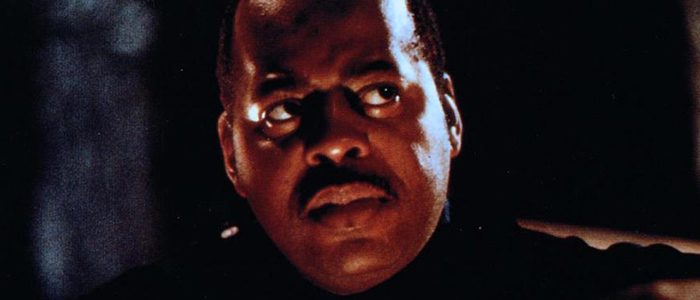
Scheer: 'I shot a kid.' Al Powell's monologue is probably the most devastating monologue. Those are the things that feel incongruous in a great way. You feel for this cop. The Al Powell character is so great.
Anderson: He was highly relatable, a great source of comic relief. I think what Die Hard did very well is it really introduced the idea of there being high comedy mixed with high action. Die Hard is a very, very funny movie. I think Powell is a big part of that.
Evans: That relationship is so brilliantly woven and designed. You forget until the end of the film when they finally lay eyes on each other and they're kind of like, 'Is it you? Are you the other guy I've been talking to?' that you realize there's been no physical interaction. They've just been on the walkie talkies. To be able to build that relationship to be that strong and feel that supportive of each other is gold.
Taylor: I was just watching a commercial for [Skyscraper]. [Dwayne Johnson] does a thing where he jumps like a thousand feet and grabs onto the side of the building. It's very similar, I guess you could call it an homage to the fire hose sequence in Die Hard. But I mean, it feels like CG, and it feels like, 'Well, he's going to make it because the computer said so. We're going to put the artificial camera out through the window, look down to an artificial 200 story height, with artificial pieces of debris and flames, and The Rock is going to be hanging there by his fingertips holding his whole 200 pound weight, and it's going to be no problem.' But man, that scene in Die Hard, it really kinda felt like he might not make it. That was dicey. It's a similar feeling that I have watching Road Warrior for the first time, or to a certain extent Lethal Weapon: it looks dangerous because it kind of was dangerous. It felt dangerous to shoot. The whole operation felt like, 'Man, they really did that!' and you felt the physics of it, the gravity, and you felt what could go wrong.
Why Does It Hold Up?
Trevorrow: I think Die Hard puts us in the shoes of the character better than any action film ever made. It's almost interactive. We can so easily imagine ourselves in McClane's position. It's hard to watch a superhero film and think, 'Here's how I would handle s*** if a giant alien ship was attacking New York.' But I can picture myself in an elevator heading to a Christmas party I don't really want to go to.
Scheer: We can all imagine: 'What if I was at a Christmas party, and this thing happened?' They're all innocents. It's not like a team of cops. It's just people at a Christmas party. Every single person in there is a normal, everyday person. I think there's something universal in the theming and the characters, and that's why it doesn't feel dated.
Taylor: I think the character and the performance from Willis stands the test of time. He's still funny, he's still charming, he's still sarcastic. He's complex. That character has warts. He's not the best guy. He's made mistakes. He's made mistakes with his family. He's made mistakes with his marriage. And he's guilty about those and punishes himself for them.
Anderson: It's like when you look at the inside of a beautiful Swiss watch. It's very intricate, but every cog has a reason for being there. Everything interacts. If you take one tiny piece out, the whole watch doesn't function. To me, that is the structure of the script of Die Hard...everything has a purpose in that film.
Lynch: I think it also helps that the film is so synonymous now with the Christmas holidays, mainly because the film embraces Christmas, right down to the lovely jingles that are sprinkled all over Michael Kamen's iconic score that is the tonal glue that keeps the intensity and comedy in check.
Alexander: You think of Die Hard, and it was ridiculous what he went through. It was ridiculous, the three different endings. How the heck did this guy survive? How the heck did all of these people come out of the building and see the big German dude hanging there and not react, you know? And then on top of it, he survives! So there was a certain ridiculousness to it.
Trachtenberg: There's a thing that bugs me about people's complaints [about the sequels]. I didn't love all the sequels. By the way, I think Die Hard With A Vengeance is as good as Die Hard. I f***ing love that movie. People sometimes scoff at the silly things that John McClane has ended up doing, but tying a fire hose to your body and jumping off the roof of a building and making it alive and also dodging Uzi fire while outrunning it is all pretty big stuff, too. It's a testament to how well-drawn the character is, and how authentic the filmmaking is that you buy all of it and you give that stuff a pass. Especially the second one has the most over the top, and the fourth and fifth are really over the top. But the filmmaking is not as grounded, so you just don't buy it. It's interesting that you can parse things out and say that they're similar, but it needs all the components to really make it feel as real as possible.
Alexander: But I remember that while it had those ridiculous 'Oh my God' moments, it was also incredibly grounded. I think that was something that few films have achieved. You walked out of True Lies and you knew it was ridiculous. But you didn't necessarily walk out of Die Hard and think, 'None of this could have ever happened.'
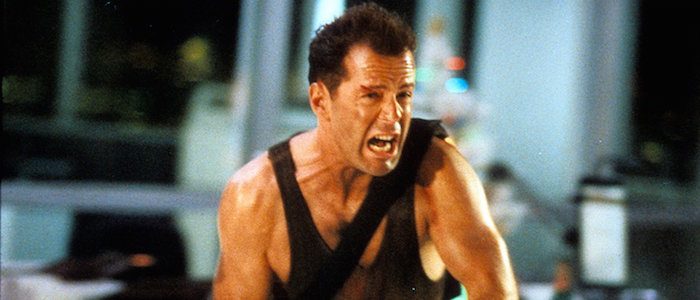
Trachtenberg: Lots of contained movies tend to stand up because they're contained. Like Dead Calm is another one of my favorites that totally holds up because you're not seeing a lot of cars and attire that gives things away. There's not a lot of source music that's so '80s, or [from whatever era in which the films are set]. [Die Hard] is a contained story, so that certainly helps. It's a very pure story. It's a 'what would I do' story – what would you do with a dilemma that you were stuck in? – and I think it lends itself to being timeless. And how real that protagonist is certainly helps.
Evans: The dialogue sparks. It's funny, it's humorous, it's touching, it's emotional. What was so genius with Die Hard is they just kept putting him in these high stakes of violence. He was vulnerable for so much of the film. He was close to breaking, emotionally as well as physically. That gives it a rare extra dimension. It makes us want to go on an adventure with him more. It makes us want him to succeed all the more as well.
Trachtenberg: It can't be overstated how much I was affected by 'real guy doing crazy stuff.' I could say that sentence about a lot of the Amblin movies, because that was 'real guy in supernatural situation,' but I think it was really cool to see an action movie with an average dude who's up against the odds, but the odds are not supernatural, they're just slightly heightened. It felt like, 'That could happen. I could find myself in a crazy hostage situation.' That stuff was sort of happening. There was a lot of plane hijacking stuff on the news, and it was all a little bit terrifying, so it was cool to see that kind of protagonist deal with that situation in a way that felt like you could smart your way out of something.
Scheer: I watched this thing with Bruce Willis one time, and he was talking about Die Hard and he was like, 'People love Die Hard because they love McClane's New Jersey sense of humor.' I'm like, 'No! That's not the reason people love Die Hard!' It makes me think it's that intangible thing that you just grab and can't quite figure out why. You kind of have to have a little bit of magic in there, too.
Lynch: Die Hard is to me a perfect cinematic confection, and for better or worse, its production and release came at a time when art and commerce, swirling inside the 40 floors of the new Fox Studios in the late '80s, combined to create pure alchemy. Cineasts love it. Average fans who couldn't give a s*** about mise-en-scene and montages love it. I don't know many people who don't love it. Die Hard connects us all, a global community who can disagree on so many things about the past, present, and future of cinema, but can unite to cheer on the right cop in the wrong place at the wrong time.
Taylor: Every now and then, one of those perfect movies just comes along, where you can just watch it a thousand times and enjoy it every single time. The beats work every single time. There's no such thing as a spoiler in Die Hard, because you know everything that's going to happen in the movie, you can't wait for it to happen, and then when it does, it's just so satisfying. When you know, as a filmmaker, how difficult it is to make a movie and how many things can go wrong and how many compromises can lead concepts astray, to see something like that where everything clicks – from the script to the performances to the directing to the action, visually, even the music – to see something like that, where it all clicks? It's just so satisfying.
Anderson: I think it's one of the best examples of a studio movie functioning at 100% of its power. I think Die Hard is a perfect example of a studio movie and what studios get right and do really, really well. It's the kind of thing Hollywood does better than anywhere else in the world. When you live outside of America, obviously in the UK or in France, people are always talking up how great their local industry and how terrible Hollywood is and how it's a horrible machine and you lose your soul when you work there. I disagree with all of that, obviously, but you look at a movie like Die Hard, and it's so impeccable well-made and done so, so well that it's hard to imagine it being done anywhere in the world other than Hollywood, California. It's one of the reasons why I moved to L.A.
Carnahan: It remains an absolute staple and pillar of the action movie genre. I don't think that'll ever change. I think it'll always remain a superior addition to the genre, and I'll probably watch it another 5,000 times before I die. (laughs)
Evans: It's the ultimate Christmas movie. It's brilliant. I can't see it, even on television, without wanting to finish it. That's as good a recommendation as you can possibly get.
James Cameron (Writer/Director – Aliens, The Terminator): Die Hard is THE GREATEST ACTION MOVIE of the '80s, and arguably the best action movie ever made. It never gets old. It is the ultimate male movie. The sheer satisfaction of the underestimated guy besting the super-smart villains, the everyman against the pros, the overwhelming odds, the classic concept of 'you picked the wrong man to mess with,' the protective husband, the pure grit of running through glass in bare feet, the overwhelmed hero talking to himself because he thinks he's about to die. It ticks every box of the male psyche. Now and forever, a classic.Update: Writer/director Joe Lynch's contributions were added to this article on 7/16/2018.

